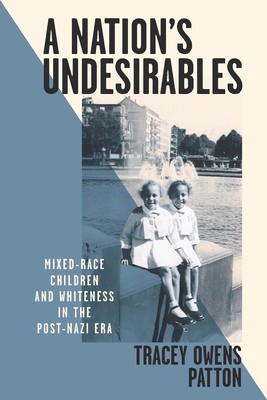
- We will send in 10–14 business days.
- Author: Tracey Owens Patton
- Publisher: Ohio State University Press
- ISBN-10: 0814259073
- ISBN-13: 9780814259078
- Format: 15.2 x 22.9 x 1.4 cm, minkšti viršeliai
- Language: English
- SAVE -10% with code: EXTRA
Reviews
Description
In a moving blend of family history and cutting-edge scholarship, Tracey Owens Patton's A Nation's Undesirables synthesizes work in rhetorical postmemory studies, critical adoption studies, Afrofuturism, and more to tell the story of her mother and aunt, Lore and Lilli. Two of thousands of children born to white German women and Black American men after World War II, the twins moved to the United States at age ten, where their mother renounced her parental rights and put them into the adoption system. They did not see her again for fifty-two years.
Patton takes up the twins' story and their reckoning with their mixed-race, Black German identity to disrupt standard narratives around World War II, Black experience in Germany, and race and adoption. Combining family interviews, historical artifacts, and autoethnographic reflection, Patton composes a new narrative of women and Black German children in the postwar era. In examining the systemic racism of Germany's efforts to move children like Lore and Lilli out of the country--and the suppression of German women's bodily autonomy--Patton amplifies the once unacknowledged identities of these Black German children to broaden our understanding of citizenship, racism, and sexism after World War II.
EXTRA 10 % discount with code: EXTRA
The promotion ends in 22d.02:09:49
The discount code is valid when purchasing from 10 €. Discounts do not stack.
- Author: Tracey Owens Patton
- Publisher: Ohio State University Press
- ISBN-10: 0814259073
- ISBN-13: 9780814259078
- Format: 15.2 x 22.9 x 1.4 cm, minkšti viršeliai
- Language: English English
In a moving blend of family history and cutting-edge scholarship, Tracey Owens Patton's A Nation's Undesirables synthesizes work in rhetorical postmemory studies, critical adoption studies, Afrofuturism, and more to tell the story of her mother and aunt, Lore and Lilli. Two of thousands of children born to white German women and Black American men after World War II, the twins moved to the United States at age ten, where their mother renounced her parental rights and put them into the adoption system. They did not see her again for fifty-two years.
Patton takes up the twins' story and their reckoning with their mixed-race, Black German identity to disrupt standard narratives around World War II, Black experience in Germany, and race and adoption. Combining family interviews, historical artifacts, and autoethnographic reflection, Patton composes a new narrative of women and Black German children in the postwar era. In examining the systemic racism of Germany's efforts to move children like Lore and Lilli out of the country--and the suppression of German women's bodily autonomy--Patton amplifies the once unacknowledged identities of these Black German children to broaden our understanding of citizenship, racism, and sexism after World War II.


Reviews